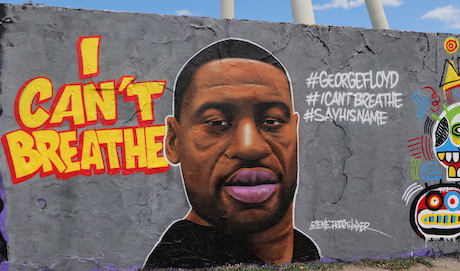George Floyd mural. Photo: Leonhard Lenz/Wikimedia Commons.
Last year, the Black Lives Matter protests became the largest in our nation’s history. People from all 50 states and around the world marched and organized for accountability, transparency and justice in law enforcement. From the streets of Washington, D.C., to outside Independence Hall in Philadelphia, and even in Boston near the harbor, the peaceful protests united a multi-racial, multi-ethnic, interfaith, and multi-generational group of millions of Americans, standing together to demand change and to express their grief and outrage at the senseless killings of George Floyd, Breonna Taylor, and so many others. They marched to state capitals and city halls to demand change from our Governors and local leaders, and to our nation’s capital to demand change on the federal level.
In those moments of unity, it seemed that more people than ever before felt the true pain and heartbreak that Black Americans have been facing for years. Change seemed to be on the horizon. Yet, as summer turned to fall, and winter now turns to spring, we continue to wait. For nearly a year since those protests, and over many decades of atrocities, we have been looking to Congress for leadership that honors the value of Black life.
We now see renewed signs of hope, with quick passage of the George Floyd Justice in Policing Act in the U.S. House of Representatives for the second time, after stalling in the Senate during the last Congress. In its current form, the bill does not go as far as many racial justice advocates want. Yet, compared to current law, the provisions in the bill would still be game-changing in terms of advancing culture change within law enforcement—something many police chiefs and also many rank-and-file officers of conscience tacitly support.
The bill would help to limit some of the most dangerous practices used by police officers, including ambush-style “no-knock” warrants and choke holds. The bill would also require federal officers to use body worn and dashboard cameras and limit the transfer of military equipment to state and local forces.
However, where the Justice in Policing Act really makes a difference is in holding law enforcement officers accountable for their misconduct. Right now, our federal laws do more to give police officers nearly complete freedom than they do to hold them accountable for egregious actions, but the Justice in Policing Act changes that, in more ways than one.
First, the bill eliminates the judge-made doctrine of qualified immunity, which makes it nearly impossible for people to recover damages in civil court when law enforcement officers violate their constitutional rights.
Second, the bill makes it easier to prosecute offending officers by amending federal criminal law that in its current form essentially blocks prosecution of officers even in the most egregious of circumstances. The so-called “willfulness” standard for convicting police officers has led countless federal prosecutors to decline to even try to bring charges against police in the infamous cases such as the shootings of Amadou Diallo, Tamir Rice, and others.
The bill also creates a national database of police misconduct, so officers who have broken the law cannot just jump to another department in a different state without repercussions. In addition, demographic data collection would be required to examine how various groups are targeted by the police.
None of these changes alone is a panacea. But, in concert, they can lay a foundation for a new era of accountability, and give communities a fighting chance to change the culture of policing in ways prior reform efforts have failed.
The House has acted, and now it’s time for the Senate to do the same. As the legislative process continues, the bill should be even further strengthened to heed advocates’ demands, not watered down.
We are at a turning point as a nation. People in literally every state and even corporations are urging the government to take bold and transformative steps to fundamentally change the broken relationship between law enforcement and communities of color. They have embraced the need for change and the importance of adopting policies that value Black life. It is time that our federal laws on police accountability did the same.
Damon Hewitt is the acting president and executive director of the Lawyers’ Committee for Civil Rights Under Law.


















